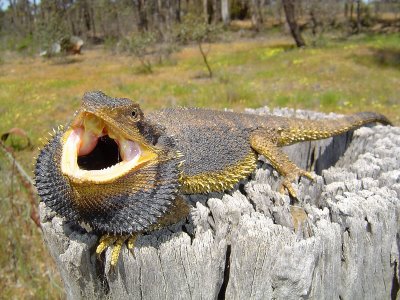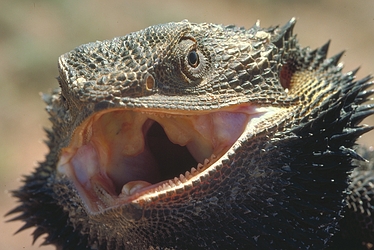Why Your Bearded Dragon Refuses to Eat Veggies - 10 Easy Tips to Solve the Problem
Meet the Bearded Dragon
Bearded dragons are adorable and fascinating lizards that make great pets. They are known for their friendly temperaments, curious personalities, and impressive appearance. Reptile enthusiasts are drawn to these creatures because of their unique qualities and low-maintenance care requirements. Bearded dragons are omnivores, which means they eat both animal and plant matter. As pets, they are usually fed a mix of live insects and vegetables. However, sometimes they refuse to eat their veggies, which can be a big problem for pet owners.
The Importance of Veggies in a Bearded Dragon’s Diet
Veggies are an essential part of a bearded dragon’s diet. As omnivores, they need a balanced mix of plant and animal matter to stay healthy. Vegetables provide important vitamins, minerals, and fiber that help regulate their digestion, boost their immune system, and prevent diseases. Some of the best veggies for bearded dragons include collard greens, kale, turnip greens, mustard greens, dandelion greens, endive, squash, pumpkin, sweet potato, carrot, and bell pepper. A varied diet is crucial to ensure that your pet gets all the nutrients it needs.
Why Your Bearded Dragon Won’t Eat Veggies
There are several reasons why your bearded dragon might refuse to eat its veggies. Some of the most common reasons are:
- Your bearded dragon is a picky eater and doesn’t like the taste or texture of certain veggies
- Your bearded dragon is used to a diet of live insects and refuses to eat anything else
- Your bearded dragon is stressed, sick, or injured and has lost its appetite
- Your bearded dragon is not getting enough variety in its diet and is getting bored with the same veggies
- Your bearded dragon is not getting enough heat, light, or humidity, which affects its appetite and digestion
10 Easy Tips to Solve the Problem
If your bearded dragon won’t eat its veggies, don’t panic. There are several things you can do to encourage your pet to eat a balanced diet. Here are some easy tips to get you started:
1. Offer a Variety of Veggies
Bearded dragons, like humans, enjoy variety in their diet. Try offering different veggies every day to see what your pet likes. You can mix and match different greens, roots, and fruits to create a colorful and nutritious salad. Rotate the veggies to keep things interesting and prevent boredom.

2. Chop the Veggies into Small Pieces
Bearded dragons have small mouths and can’t eat large pieces of veggies. Make sure to chop the veggies into small, bite-sized pieces that your pet can easily chew and swallow. You can also shred or blend the veggies to make them easier to digest.
3. Mix the Veggies with Insects
If your bearded dragon is used to a diet of live insects, try mixing the veggies with a few insects. This will entice your pet to eat the veggies and get a taste of the good stuff. Make sure to remove any uneaten insects after a few hours to prevent them from escaping into the enclosure.

4. Use a Feeding Dish
Some bearded dragons prefer to eat out of a feeding dish rather than off the ground. Try placing the veggies in a shallow dish and see if your pet takes a bite. This will also prevent the veggies from getting mixed up with the substrate and becoming dirty.
5. Hand-Feed the Veggies
If your bearded dragon is shy or hesitant, try hand-feeding the veggies to it. This will create a bond between you and your pet and show it that the veggies are safe and tasty. Offer a small piece of veggie at a time and wait for your pet to eat it before giving more.

6. Make the Veggies More Appealing
Bearded dragons are attracted to bright colors and strong smells. Try adding some fruit, flowers, or herbs to the veggies to make them more appealing. You can also sprinkle some calcium powder or chicken baby food on top of the veggies to add flavor and nutrients. Avoid adding salt, sugar, or spices, as they can be harmful to your pet.
7. Adjust the Temperature and Lighting
Bearded dragons need specific temperature and lighting conditions to thrive. If your pet is not getting enough heat, light, or humidity, it can affect its appetite and digestion. Make sure to provide a basking spot, a UVB light, and a water dish in the enclosure. Monitor the temperature and humidity levels regularly and adjust them as needed.

8. Reduce the Amount of Live Insects
If your bearded dragon is refusing veggies because it is too full of live insects, try reducing the amount of insects you feed it. Bearded dragons only need a few insects a day, depending on their size and age. Too many insects can cause obesity, metabolic bone disease, and other health issues. Make sure to balance the insect intake with the veggie intake.
9. Make Sure Your Bearded Dragon is Healthy
If your bearded dragon is still refusing veggies after trying these tips, it might be a sign of an underlying health issue. Bearded dragons can suffer from various illnesses, such as respiratory infections, parasites, or impactions, that can affect their appetite and behavior. Make sure to take your pet to a reptile veterinarian for a check-up and diagnosis.

10. Be Patient and Persistent
Teaching your bearded dragon to eat veggies is not an overnight process. It takes patience and persistence to introduce new foods and habits to your pet. Keep offering the veggies every day and don’t give up if your pet refuses them at first. Be gentle and positive, and reward your pet with praise and treats when it eats some veggies. With time and effort, your bearded dragon will learn to love its veggies and have a healthier and happier life.

In conclusion, feeding your bearded dragon a balanced diet of veggies and insects is crucial to its health and well-being. If your pet refuses to eat its veggies, try the above tips to encourage it to eat a varied and nutritious diet. Remember to monitor your pet’s behavior and health regularly and consult a vet if needed. With love and care, your bearded dragon can live a long and happy life as your loyal companion.
